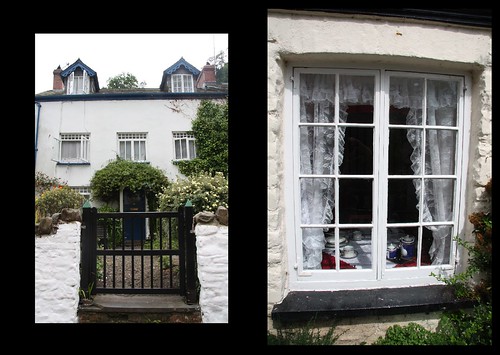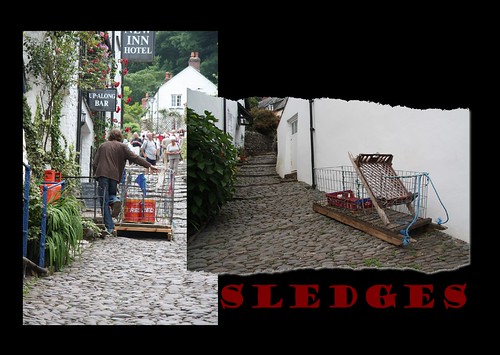living history
by Rachael
Weston-super-mare, England via Clovelly
He used to cycle out to this little beachside town back in the day. Way back when, the street was so steep it was closed to vehicular traffic; only donkeys and sledges plied the cobblestones. Today it is exactly the same. And if you ignore the commercialisation of having to pay to enter the village and the monstrous tourist information cetre-cum-cafe-cum-bookshop-cum-souvenir shop that you have to walk through to get to the village itself, nothing has changed. If anything, Grandpa was surprised – he reckons the lane is narrower and steeper nowadays!
Back then there was no audio-visual presentation to give the history of the town – over two thousand five hundred years old, and owned by only two families that whole time. Can you even imagine that? Now there’s a very informative documentary film presented in a creative theatre complete with fishing boat and old church pews.
Back then none of the houses were open to the public. Now a couple have been made into a museum stuffed full of photos and newspaper articles and voice recordings of a poem written when some of the men didn’t come back from a fishing trip (very sobering, a moving poignant moment in the visit – only days after arriving home for a month’s leave from the war, a young man in his thirties with three young sons was one of the unfortunate – in the photo of his wife and boys taken shortly after the tragedy, their grief could not be concealed). There are displays of how the cob/brick walls were made (and continue to be repaired today), an indoor well with supposed-to-be-thought-provoking questions about water usage (how would you live if you had limited water? Well, how ARE we living with limited water in the motorhomes? How would you live if you had to collect water from a well? Rephrased to how DID we live when we collected water from a well in Mongolia?), there’s the memorial to sailors who never came home, the tide chart down at the quay (oh the mighty Atlantic Ocean – we are feasting our eyes on its beauty each day), there are shops selling homemade fudge and printed silk (and southern fried chicken and plastic water guns), there is the stable of donkeys and the old police station sharing its quarters with a medical centre, there is a handwritten poem adorning a wall – all 26 verses of it, there are cottage gardens and wooden gates, there are milk bottles delivered to the doorstep and washing hanging on the clothesline; there is evidence of life and history and future.
Visiting Clovelly made me think of our visit to the ancient town of Yangmei in China. We had to pay to get in there too! And there were handmade souvenirs for sale. But other than that, people were continuing life much as they had for a couple of thousand years. Of course, in Clovelly there is now running water; in Yangmei they still have big water pots outside their houses and take the washing down to the river. In Clovelly there are cafes with cafe prices; in Yangmei there were roadside sellers with very basic food, nothing geared to tourists. Come to think of it, we were the only white faces we saw there. But in Clovelly we heard as many Germans as English. The Industrial Revolution has moved Clovelly on – in fact, it was the steamships, which enabled a major influx of tourists to descend on the town, people wanting to see the setting for Charles Kingsley’s Westward Ho! (You may know him better a the author of “The Water Babies”). The Industrial Revolution has not yet impacted the daily life of Yangmei residents, other than taking them away on a bus occasionally or bringing some of us to live with them (by the way, you can check out the Wikipedia article about Yangmei and see Rob’s first famous photo if you like!). Our children LIKED Clovelly, but would prefer to live in Yangmei! The reason? It was a more “real life” town, instead of one filled with tourists.






Three fishers went sailing away to the west,
Away to the west as the sun went down;
Each thought on the woman who loved him the best,
And the children stood watching them out of the town;
For men must work, and women must weep,
And there’s little to earn, and many to keep,
Though the harbour bar be moaning.
Three wives sat up in the lighthouse tower,
And they trimmed the lamps as the sun went down;
They looked at the squall, and they looked at the shower,
And the night-rack came rolling up ragged and brown.
But men must work, and women must weep,
Though storms be sudden, and waters deep,
And the harbour bar be moaning.
Three corpses lay out on the shining sands
In the morning gleam as the tide went down,
And the women are weeping and wringing their hands
For those who will never come home to the town;
For men must work, and women must weep,
And the sooner it’s over, the sooner to sleep;
And good-bye to the bar and its moaning.
~Charles Kingsley


Time on the road: need to check Jboy13’s record!
Distance covered: 220km
Tags: grandpa's stories, history, postcard: England, transport




The poem! Wow! That village is so darn cute it hurts!!
Have been really enjoying following your travels. You have been providing our family with some additional educational material in the last few days as we have been reading ‘Our Island Story’ by H.E. Marshall about ‘The Giant’s Dance’ and King Arthur and King Alfred etc. We would love to meet your family one day.
Our local paper contained the following in it’s “Odd Spot”: “Next time you’re in Britan, check your change. The Royal Mint admits it’s made a rare error – and produced coins without a date on them. The mint said today at least 100,000 of the yearless 20-pence coins slipped into circulation at the end of last year. If found one coin would be worth hundreds of times more on the collectors’ market.” – True or not, I don’t know but could be worth checking out?
So pretty!